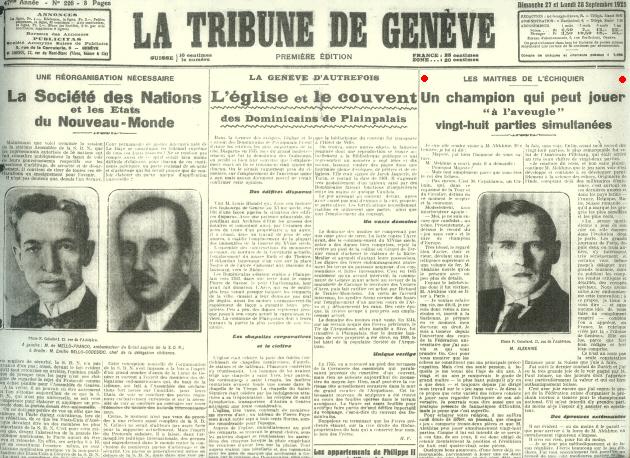
Edward Winter
C.N. 7263 quoted a remark by Mikhail Botvinnik on page 248 of International Championship Chess by B. Kažić (London, 1974):
‘Alekhine’s was a complex character. As soon as he felt any signs of hostility, he would shoot out his quills like a porcupine. When people were kind he felt bound to behave in the same way.’
That complexity makes it especially useful to retrieve from forgotten publications all possible information that can be gleaned from the interviews given by Alekhine. A number of such items have been presented in C.N. over the years, and examples are offered in the present article.
C.N. 6613 reproduced an interview with Alekhine which was published on page 1 of the Tribune de Genève, 27-28 September 1925:

Another interview with Alekhine, by Lucien Zacharoff, was printed on page 7 of the Brooklyn Daily Eagle, 19 May 1929. A copy was presented by John Blackstone (Las Vegas, NV, USA) in C.N. 7260:
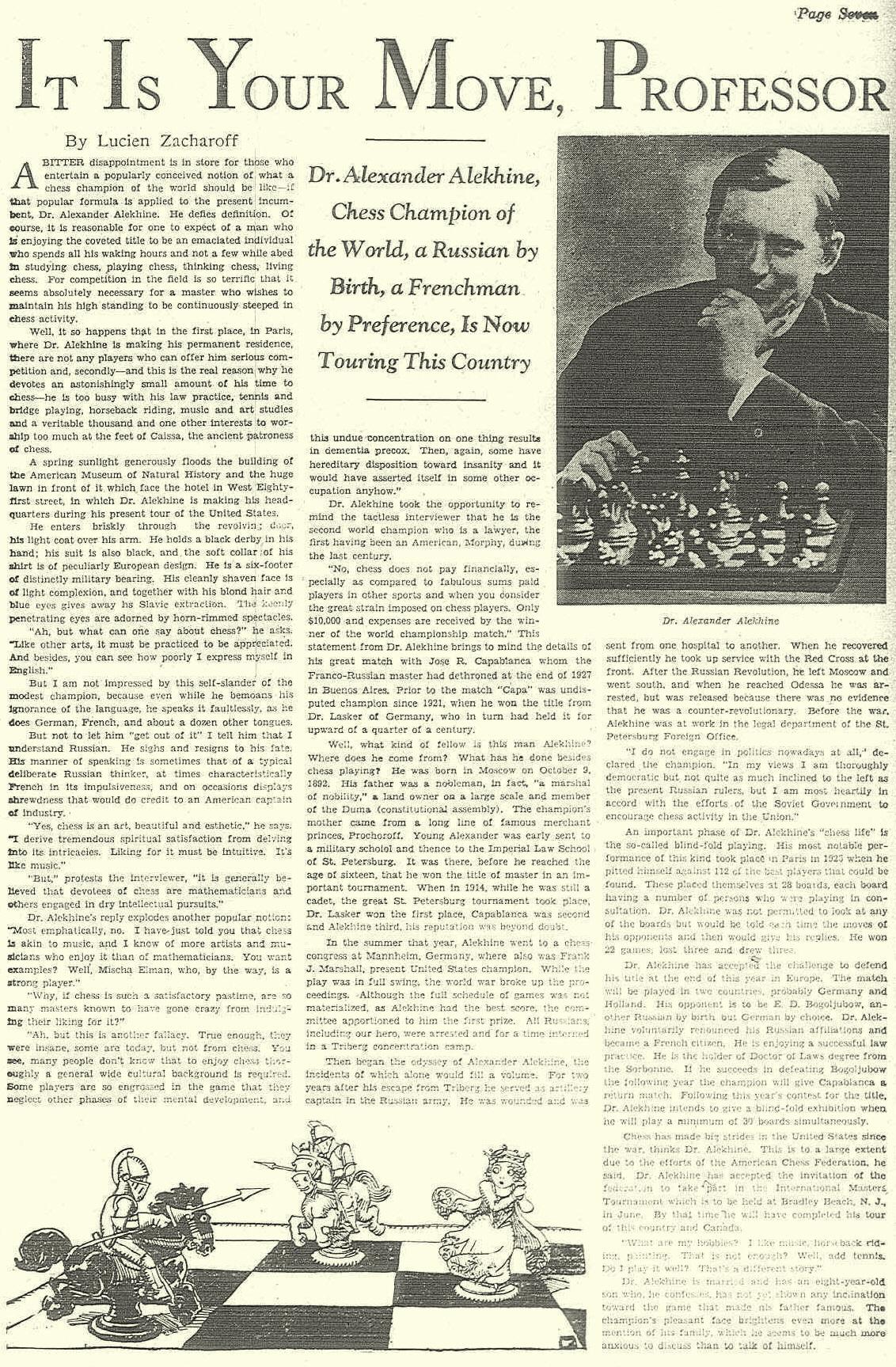
From Alekhine’s observations the following particular comments may be noted:
‘Yes, chess is an art, beautiful and esthetic ... I derive tremendous spiritual satisfaction from delving into its intricacies. Liking for it must be intuitive. It’s like music.’
(Asked why so many masters are ‘known to have gone crazy’ from indulgence in chess.) ‘Ah, but this is another fallacy. True enough, they were insane, some are today, but not from chess. You see, many people don’t know that to enjoy chess thoroughly a general wide cultural background is required. Some players are so engrossed in the game that they neglect other phases of their mental development, and this undue concentration on one thing results in dementia precox. Then, again, some have hereditary disposition toward insanity and it would have asserted itself in some other occupation anyhow.’
‘I do not engage in politics nowadays at all ... In my views I am thoroughly democratic but not quite as much inclined to the left as the present Russian rulers, but I am most heartily in accord with the efforts of the Soviet Government to encourage chess activity in the Union.’
‘What are my hobbies? I like music, horseback riding, painting. That is not enough? Well, add tennis. Do I play it well? That’s a different story.’
Wayne D. Komer (Toronto, Canada) and Stephen Wright (Vancouver, Canada) submitted in C.N. 7016 an interview with Alekhine by Archibald Lampman which was published in the Toronto Daily Star, 14 November 1932, page 3:
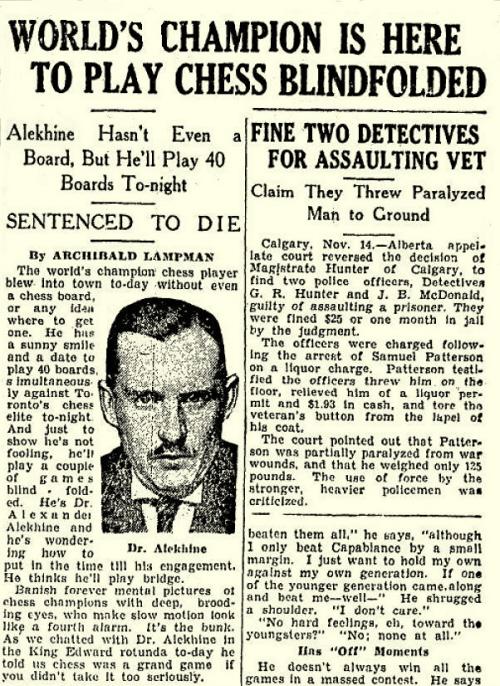
The C.N. item gave a full transcript. Below are some extracts:
‘“Are you good at figures, doctor?”, we asked. “I mean are you one of those chaps who can juggle a hatful and know all the answers?”
“No good at mathematics at all”, he says surprisingly. “No good at any of the exact sciences.” “Well, don’t you call chess an exact science?” “No, it’s an art. I’m pretty good at philosophy and all the abstract sciences.”
“Tell us, doctor – how do you train for these big bouts?” “Train? I don’t train – I knew all about it long ago – I haven’t even got a chess board.” Anybody lend the doctor a chess board?
“You mean to say you won’t slip upstairs and have a couple of rounds of shadow boxing with the chess board before you encounter the boys tonight?” He laughed. “I don’t know how I’ll put in the time – maybe play a little bridge.” “Good at bridge?” “Just a fairly good player.” ...
“Women good at chess?” “No – they’re not”, he says smiling. And, by the way, if all the Moscow lads smile like that, the home town can’t be so bad after all. “And that’s funny too – because they’re good at bridge and other things – but not chess.” “Just another mystery.” “About women?” “Yes, just one more.”
He has a library of 1,600 books on chess. “Read them all?”, we asked. “No”, he says off-hand, “I know what’s in them.” He has written eight books on chess himself.
“Anybody around the world now that can beat you, do you think?” “No, I don’t think so. I have beaten them all”, he says, although I only beat Capablanca by a small margin. I just want to hold my own against my own generation. If one of the younger generation came along and beat me – well – .” He shrugged a shoulder. “I don’t care.”
“No hard feelings, eh, toward the youngsters?” “No; none at all.” ...
We switched to the man himself. By the way, he smoked one cigarette after another as he talked to us – if that’s any help to you chess aspirants. And so did we, if that’s any interest. “You come from a noble family?”, we opened tentatively, as you can’t tell how people are going to look on this kind of thing.
“Yes – my father was marshal of Voronesh”, he says, “Russia under the czar was divided into states – my father was head of one of those states.”
“Did your family suffer a lot in the revolution?” No – not so much. I was sentenced to death”, he says, something like “The traffic cop hands me a ticket, see.” “Sentenced to death! – well, how did you get out of that?” We had to arouse some interest in the man about his own death sentence. He just shrugged his shoulder. “Blew over, eh? – this shooting business?” He laughed his sunny laugh again. “Yes – just blew over.”
He was an officer in the German [sic; Russian] army. He’s 40 now, so he couldn’t have been any veteran then. He’s also a reserve officer in the French army as well as being a lawyer. So that’s why he doesn’t care whether he wins or not. Twelve years ago he left Moscow for the last time.
“I’m practically an exile now”, he says, as though exiling was a great sport. “Why’s that?”, we asked. “Just because they don’t like you?” “No, they don’t like me – and I’m anti-Communist.”
He says in the old days there’d be about a million grade A chessplayers in Russia. Moscow was a great centre. “Didn’t the Soviets do something about the chess boards – kings and queens and everything?” “No, they didn’t worry about them. They still play chess.”
Dr Alekhine started to play chess at the age of seven. The family made him quit. “I was always good”, he said, as naturally as you’d say, “I’m punk at bridge”. He began again at 12. They let him go to it. He joined the local club at 15. And at 16 was a master of chess. Tie that.
“Was your dad good at chess?” “He played, but he wasn’t much good”, he said. By the way, there have only been seven or eight chess champions in the last 250 years. It’s not one of those things you rush into.
“When are you going to quit?” “Oh, I don’t know – perhaps I’ll practise law later on.” He’s going to the Far East to clean up on Gandhi’s crowd and then the Aussi playboys.
“Sure you’re not worrying about tonight?” He grins – jaunty, we call it. “Not much”, he says, and grabs our hand.’
C.N. 5631 supplied excerpts from an interview with Alekhine by Isaac Kashdan on pages 9-10 of the September 1933 Chess Review:
‘Particularly in Asia I was interested in the number of different peoples that play chess, and also in the varieties of the game itself. It is there that chess probably originated. I found several simple forms, and others even more complicated than the game we know. It may be, in time, that we can combine the best features of the Oriental game with our chess. This would be a more natural evolution than adding new pieces and squares, or some of the other changes that have been proposed. I do not believe that chess needs any change at present, as it still holds new wonders, and will continue to do so for years to come.’
‘I do not believe it is the function of the world’s champion to go on constant barnstorming tours. I wanted to make the world trip to become personally familiar with the conditions of chessplaying everywhere, and also to meet so many individuals whom I had known through magazine pages or correspondence. But I believe I can do more for chess in other ways, notably by writing. With more leisure, I could work out methods of instruction, and perhaps eventually be at the head of a vast system of schools and coaches, as has happened in contract bridge under Ely Culbertson. This would mean many new converts of chess, and cause a great awakening of public interest, as more and more people were initiated into the mysteries of our glorious game.’
A particularly significant pair of interviews in Spanish publications was submitted in 1987 by the late Pablo Morán (Gijón, Spain). Our translations into English are available on-line in Two Alekhine Interviews (1941). The importance of the articles relates, above all, to the much discussed question Was Alekhine a Nazi?
C.N. 5804 gave, courtesy of Juan Carlos Sanz Menéndez (Alcorcón, Spain), an interview with Alekhine by ‘Austral’ in the weekly news magazine Semana, 26 October 1943:
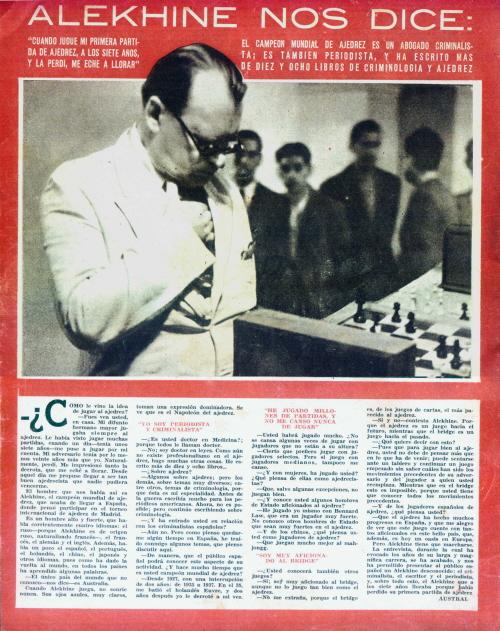
Mr Sanz Menéndez provided a transcript which was given in full in C.N. 5804. To highlight some of the main points made by the world champion: the loss of his first game of chess, when he was aged about seven, reduced him to tears; with a few exceptions, women did not play chess well; to his knowledge, the only strong chessplayer among heads of state was Bonar Law, whom he had played (‘a very strong player’); the Chinese were much better at mah-jong than at chess. Alekhine also made some interesting observations on chess and bridge, but we are particularly intrigued by the many references to his being a criminalista (criminologist or criminal lawyer). He is even quoted as claiming to have written more than 18 books ‘some on chess, but the others on a wide range of subjects, including criminology, because that is my speciality’.
The above article originally appeared at ChessBase.com.
Christian Sánchez (Rosario, Argentina) notes an interview with Alekhine by Carlos M. Portela on page 8 of the magazine Caras y Caretas, 4 September 1926:
The accompanying photograph:
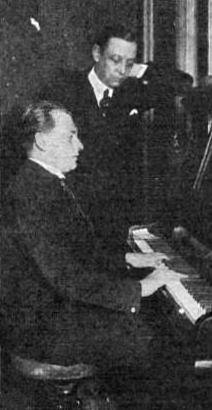
Mr Sánchez highlights some points from the article:
(7290)
An interview with Alexander Alekhine shortly after his 1929 world championship match against Bogoljubow has been brought to our attention by Thomas Niessen (Aachen, Germany). It was published in the Allgemeine Zeitung (Chemnitz) and reprinted in the Aachener Anzeiger – Politisches Tageblatt of 30 November 1929:
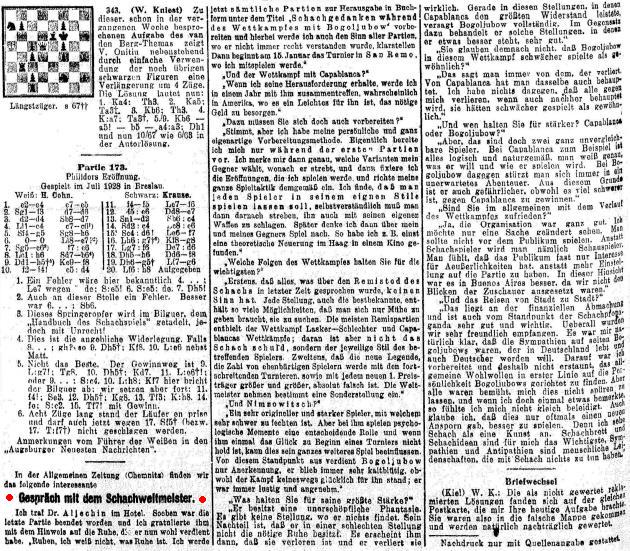
Below is our translation:
‘Conversation with the world chess champion
I met Dr Alekhine in the hotel. The last game had just finished, and I congratulated him with the comment that he had now truly earned a rest.
‘A rest – I do not know what that is. I am now going to prepare all the games for publication in book form under the title “Chess Thoughts During the Match with Bogoljubow”, and I shall clarify the meaning of all the games, where it was not always understood correctly. Then on 15 January there begins the San Remo tournament, in which I am taking part.’
‘And the match with Capablanca?’
‘If I receive his challenge, I shall meet him in a year’s time, probably in America, where it is an easy matter for him to acquire the money necessary.’
‘For that too you need to prepare.’
‘That is true, but I have my personal and quite idiosyncratic method of preparing. Essentially, I prepare only during the first games. I note exactly which variations my opponent chooses, what he is striving for, and then I select the openings which I shall play and establish my entire tactics accordingly. I find that each player should be allowed to play in his own style, but it is naturally then necessary to try to defeat him with his own weapons. Later on, I think about my own play, and my opponent’s. To give an example, in The Hague on one occasion I found a theoretical novelty in a cinema.’
‘What do you regard as the most important consequences of the match?’
‘Firstly, that everything that has been said recently about the draw death in chess is senseless. Every position, and even the best known, contains so many possibilities that it is merely necessary to make the effort to look for them. The largest number of drawn games was in the Lasker v Schlechter match and in Capablanca’s matches; however, that is the fault not of chess but of the style of the players concerned. Secondly, that the new legend that, with the progression of tournaments and every new winner of a first prize, the number of evenly-matched players will become larger and larger is absolutely false. No doubt the world champions occupy a special position.’
‘And Nimzowitsch?’
‘A very original and strong player with whom it is very difficult to do battle. However, for him psychological moments play a decisive role, and if fortune does not smile on him at the start of a tournament, this can affect his entire subsequent play. From that standpoint, Bogoljubow merits only respect, for he always remained very cool-blooded even if the situation in the battle was by no means fortunate for him. He was always cheerful and pleasant.’
‘What do you consider to be his greatest strengths?’
‘He possesses inexhaustible fantasy. There is no position where he finds nothing. His disadvantage is that in a bad position he does not have the necessary calm. It then seems to him that the position is lost, and he does indeed lose. Precisely in the positions where Capablanca managed to put up the greatest resistance, Bogoljubow breaks down completely. In contrast, he handles very well positions in which he stands somewhat better.’
‘So you do not believe that Bogoljubow played more weakly in this match than usual?’
‘That is what is always said about the player who loses. The same was also asserted about Capablanca. I have nothing against everyone losing against me even if afterwards it is claimed that they played more weakly than usual.’
‘Whom do you consider stronger? Capablanca or Bogoljubow?’
‘Oh no, it is really not possible to compare the two players. With Capablanca, for instance, everything is logical and natural. One knows exactly what he wants and how he will play. With Bogoljubow, though, it is always a case of being hurled into an unexpected adventure. On that account he is also more dangerous, although it is much more difficult to win against Capablanca.’
‘Are you satisfied overall with the course of the match?’
‘Yes, the organization was quite good. There is just one thing that I should like to see changed. The games should not be played in public. Instead of a chessplayer, one becomes a performer. The impression given is that the public is more or less interested only in outward appearances, instead of focussing on the game. In this respect it was better in Buenos Aires, as we were not exposed to the eyes of spectators.’
‘And travelling from city to city?’
‘That was because of the financial agreement, and from the standpoint of chess publicity it is very good and important. Wherever we went, we received a very friendly welcome. It was obvious to me that the sympathies lay with Bogoljubow, who lives in Germany and wants to become German. I was prepared for that and was therefore not surprised that general goodwill was primarily directed at Bogoljubow’s personality. But everyone was at pains not to give any such impression, and if I ever noticed anything I did not feel offended. I also think that this often gave me a fresh incentive to play better. I regard chess as an art. For me, the chess board and chess ideas are the most important thing. Sympathy and antipathy are human passions which have nothing to do with chess.’
(7567)
From page 11 of the Observer, 3 June 1928:


The newspaper’s chess correspondent, Brian Harley, included the interview on pages 35-39 of his book Chess and its Stars (Leeds, 1936).
(8488)
See too C.N.s 8489 and 9214.
As reported in C.N. 95 (see pages 375-376 of Kings, Commoners and Knaves) Alekhine stated in an interview, ‘Chess has been a minor factor in my life’. The full item to which C.N. 95 referred (Chess Review, January 1945, page 13) is shown here:
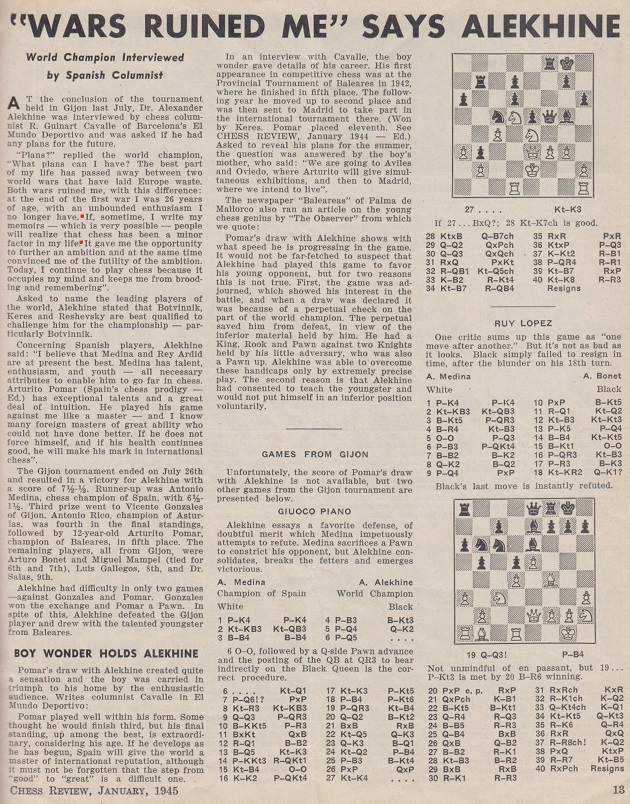
However, a footnote on page xiii of A. Alekhine Agony of a Chess Genius by Pablo Morán (Jefferson, 1989) stated that the interview came from the Gijón daily newspaper El Comercio of 22 July 1944 and was conducted by Juan Fernández Rúa (and not, as indicated in the first paragraph of the Chess Review article, by Ricardo Guinart Cavallé in El Mundo Deportivo).
Can the original Spanish-language interview be found?
(8971)
Addition on 5 May 2022:
Terje Kristiansen (Tönsberg, Norway) draws our attention to a feature on page 2 of Tidens Tegn, 5 May 1930 in connection with Alekhine’s visit to Oslo.
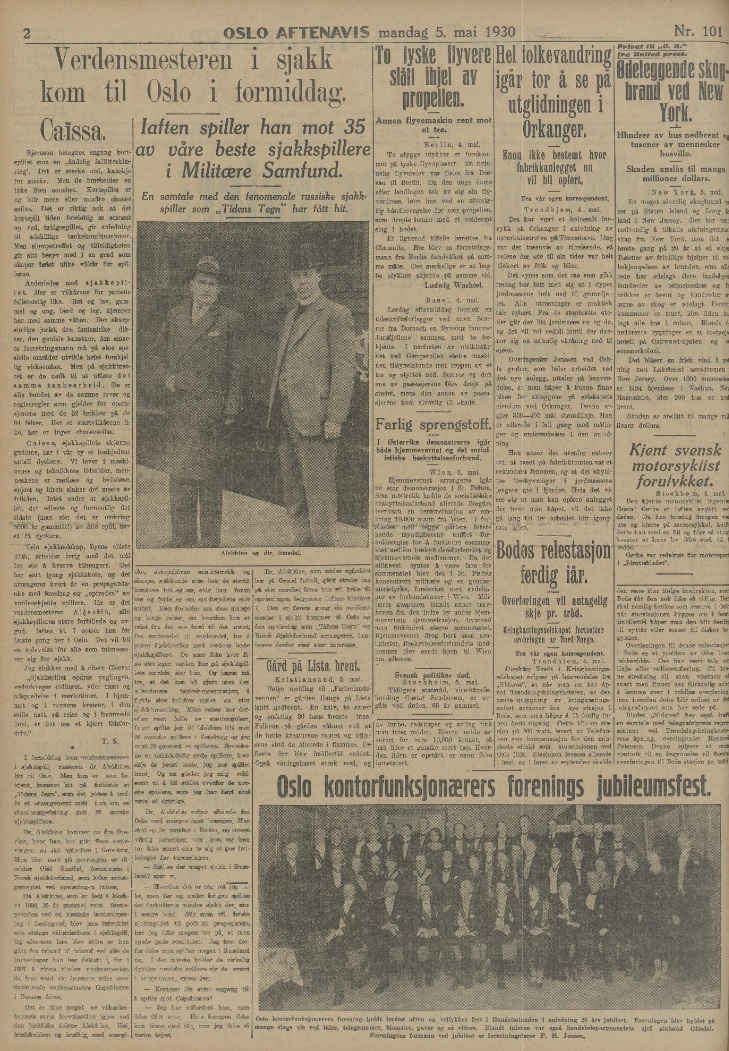
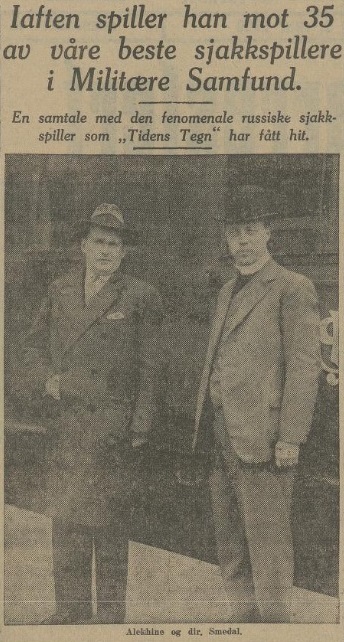
Our correspondent provides the text of the brief interview, together with his English translation:
‘Spilles der meget sjakk i Russland?
Hvordan det nu er, vet jeg ikke, men før og under krigen spiltes det forholdsvis mindre sjakk der, enn i andre land. Når man vil bruke sjakkspillet til politisk propaganda, har jeg ikke megen tro på, at man oppnår gode resultater. Jeg tror derfor ikke man spiller meget i Russland nu. I det minste holder de virkelig dyktige russiske spillere sig da svært i bakgrunnen, synes jeg.
Kommer De atter engang til å spille mot Capablanca?
Jeg har utfordret ham, men ikke fått svar. Hvis kampen ikke kan finne sted i år, tror jeg ikke vi møtes igjen.’
[‘Is much chess played in Russia?
How it is now I do not know, but before and after the War, there was relatively less chessplaying than in other countries. If they want to use chess for political propaganda, I do not believe that they will achieve good results. I therefore do not think that much chess is played in Russia. The really good Russian chessplayers stay in the background, I believe.
Will you ever play Capablanca again?
I have challenged him, but without receiving an answer. If we cannot play this year, I do not believe that we shall play again.’]
To the Chess Notes main page.
To the Archives for other feature articles.
Copyright: Edward Winter. All rights reserved.